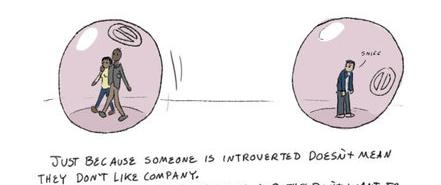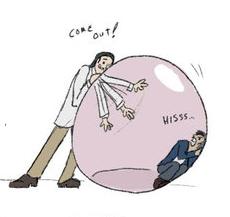You might have seen one of those “Caring for Your Introvert” posts and articles that circulate on the web, purporting to explain our quiet ways to the more outgoing majority. Earlier this year, blogger Rowan Badger gave the Internet something it was missing: a guide to The Care and Feeding of Your Extrovert. Whether you’re more extroverted, more introverted, or close to the middle of the spectrum, I recommend reading her post.
Badger complains about pro-introversion articles that say things like, “‘You need to understand that unlike extroverts, we’re not yappy dogs just spewing whatever trivial thoughts happen through our shallow brains.'” I’m guessing she was talking about this Atlantic article, which I discovered (and admittedly relished) in high school. “As often as I have tried to explain [my introversion] to extroverts,” the author laments, “I have never sensed that any of them really understood. They listen for a moment and then go back to barking and yipping.”
How did I miss the contemptuous, self-congratulatory tone of that article? I think it had to do with when I read it. “Caring for Your Introvert” was my Catcher in the Rye.
I was in eleventh grade. I didn’t really have a social life (though there were reasons for that beyond my introversion). Being an introvert, I didn’t mind this very much, especially since I had a close confidante in one of my teachers. But I did look at the teenagers around me – ever grouping, ever talking – and wonder why I was so different. Furthermore, I was confused by the things they did. Why was this random person asking me what I did last weekend? Why would she care? (Perhaps because she didn’t realize how boring my weekends were.)
It was a relief to learn there was a word, nay, a psychological construct for people who don’t spontaneously strike up conversation with those around them. It was also quite nice to think I was part of a group that was “more intelligent, more reflective, more independent, more level-headed, more refined, and more sensitive,” as the Atlantic article claims, right after asserting that introverts are not arrogant. (Really, Mr. Rauch, do you think about what you say before you say it?)
I’ve read a lot about introversion, but not much about extroversion, so I was glad when I stumbled on Badger’s blog post a few days ago. Some of her points demonstrate that we’re just as alike as we are different:
1. Human contact is a need for us. It’s not as intense as food or water; it’s more like the need for sleep. We won’t necessarily die outright if we don’t get it on a regular basis, but we’ll be unfocused, unhappy, and emotionally unstable. If I go too long without substantive human contact, without touch or conversation or genuine interaction, I get listless, then depressed.
So do I. So does anybody, really, unless they have schizoid personality disorder. It’s difficult to compare notes here, though, because I’m not sure what she means by “substantive human contact” and “genuine interaction.” Extroverts and introverts don’t seem to differ in their need for substantive, nourishing interactions and relationships. But deep conversations are few and far between, so brief or casual (I’m trying to avoid the word “shallow”) interactions are the “fast food” that keep extroverts going. The thing about introverts is that
- we feel “full” much sooner and can “fast” for longer periods of time,
- we get sick of fast food really really quickly, and
- we don’t get much out of it anyway.
I do need human contact, but small talk doesn’t feel like contact to me. It feels like an exercise in generating things to say when I have nothing in particular to communicate, and the effort involved cancels out most of the psychological benefits of the interaction.
There is a type of superficial interaction that I get some satisfaction from: interaction that is structured and purposeful. I’m thinking of my old job working at a late-night grille in college and my current job in the school library. Someone says “Hi,” they ask for something (an order of mozz sticks, a textbook), and I give it to them. It’s a conversational quick-fix that has a point to it (they asked for a book because they need the book, not because they feel the urge to talk). I have no problem responding, because there is actually something I need to tell them (“I’m sorry, it’s checked out right now. There’s an older edition in the stacks; would you like me to go get it?”). I’m not just talking for the sake of talking, which is what small talk feels like to an introvert. Also, I get to do things for people, like help them deal with our monstrous Xerox machine.
So basically, introverts are like camels, drinking deeply and then going for long periods of time without water. Extroverts are like… I don’t know… thirsty plants that enjoy a good rain but will make do with a bit of condensation? But the important thing is that we both need water.
(Yeah, I haven’t used metaphors in a while. Bear with me, guys.)

I thought of putting pictures of a camel and plant here, but this (also by SVeidt on deviantArt) is so much better.
But all of this has been said before. What I really like about Badger’s post is the stuff that wouldn’t have occurred to me.
5. Contrary to popular belief, it’s not an extrovert-friendly world, and it’s becoming less so. When I am among people, I make eye contact, smile, maybe chat if there’s an opportunity (like being stuck in a long grocery store line). As an extrovert, that’s a small ‘ping’ of energy, a little positive moment in the day. Now, though, more often than not people don’t meet one another’s eyes, they don’t smile or shake hands, they keep iPod ear buds or Bluetooth headsets in their ears at all times, eschewing human contact.
It’s true, and while I do sense the awkwardness of people avoiding each other’s eyes in queues, I would not have realized the toll this must take on some extroverts. Badger goes on to say, “The rise of social media *seems* like it would be a blessing to extroverts, except that it only mimics genuine interaction.” Well, that’s just silly: while extroverts and introverts both do the social media thing, everyone knows that introverts are the ones who favor online interaction. The Facebook “Like” is our small ‘ping’ of positivity.
7. We may make this look easy, but it’s not. Many extroverts suffer from various forms of social anxiety, compounded by the knowledge that if we do or say the wrong things, if we are perceived to be thoughtless or undesirable in a social setting, we’ll be unwelcome in the group. If that happens often enough, a necessary part of our psyche will starve and fail. When I walk into a roomful of people, the stakes are higher for me than they are for non-extroverts, because I *need* to be welcome there. When I walk out of a roomful of people, you can rest assured that I am rehashing every single conversation I had, going over everything I said, second-guessing every word and gesture. I am acutely aware of every mistake I made, even the ones I only imagine to have occurred.
I’d be interested to know just how prevalent this is among extroverts vs. introverts, because I think of social anxiety as its own thing, not necessarily related to extroversion or introversion. An introvert might develop social anxiety because s/he never acquired the small talk toolbox, which is often necessary for paving the way to more meaningful interactions. In any case, if you’re an extrovert in my life who anxiously rehashes every conversation after its over, I’m sorry – I had no idea. Chances are, I was relieved that you were doing the talking.
9. When you see us moving through a crowd at a party, talking to fifteen or twenty people in the span of your one conversation, don’t assume we’re being insincere or flighty… Years of interaction have taught us that in a social setting, our intensity can start to wear on people after too long, so (especially when first arriving at a gathering) we tend to float from group to group, in order to not burn out any one person’s tolerance.
I found this fascinating. I’ve known people whose “vibrant” or “intense” personalities were sources of social difficulty for them, so it squares with my experience, but I don’t think I would have made the connection. I just watched in awe as they filled the room with vitality.
And finally:
10. We know what we are and we know it’s not going to change. We’re aware, for the most part, that everyone is not like us, and we’re trying to get essential needs met in the way that is least intrusive and invasive to people we recognize as very different from ourselves. As confident or self-assured as we may seem, most of us are laboring under a constant worry that we’re annoying everyone around us, that we’re wearing on everyone’s last nerve, and that we’ll be sent away to wither alone. We depend on you, our friends and loved ones, for something we know we can’t do without. Your extrovert will understand if you come home from a long day at work and say, “Hey, hon, I need a little down time before dinner,” but if you just shut the door to your office or workshop without communicating the all-important “this is not about YOU and it is only for a couple of hours,” it can be a deeper rejection than you could possibly imagine.
An extrovert in my life highlighted this as particularly relevant. It was a revelation to me, but in retrospect, it shouldn’t have been. So I want to respond to two concerns I often hear from my extroverted friends: “I hope I’m not boring you” and “I hope I’m not bugging you.”
If you’re talking about something that’s important to you, or interesting to you, or emotional for you, then you’re not boring me. And if you’re not trying to make me do too much talking or go out when I’m not in the mood, then you’re not bugging me, either. When I’m in a particularly introverted mood, I stay away from GChat, and I don’t answer my phone. (I do listen to voice messages to make sure I’m not ignoring an emergency call.) So if you get hold of me by one of these methods, you can rest assured that I’m up for a chat.
There’s a lot of good stuff in Badger’s post that I haven’t mentioned, so here’s the link again. And here’s a link to a relatively non-smug article about introversion.
